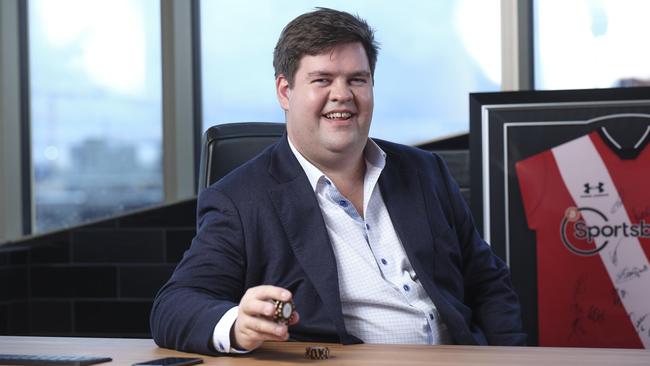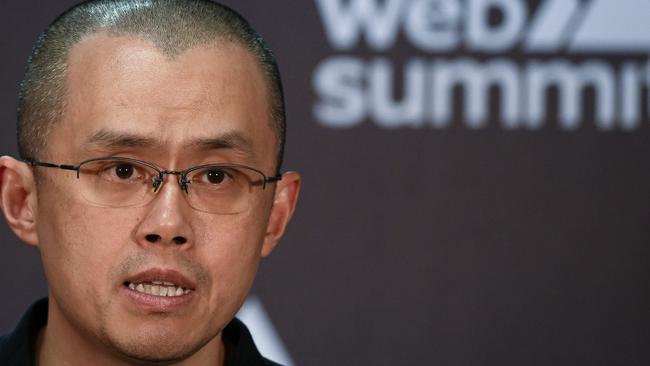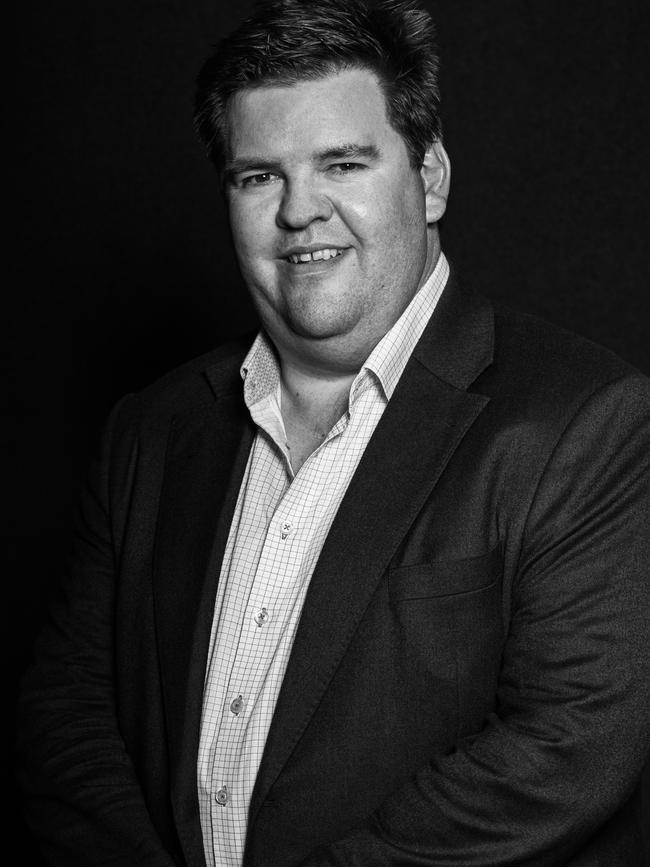The Victorian country boy who’s become an online betting mogul in Estonia
It’s likely that you’ve never heard of Tim Heath but this low-key tech entrepreneur from rural Victoria has built a $1bn VC fund.

It’s likely that you’ve never heard of a tech entrepreneur named Tim Heath but this low-key character from the most rural of towns in Victoria has become quite a big wheel in the Estonian capital of Tallinn.
A charming medieval locale on the northernmost tip of the Baltics, it’s a city that doesn’t attract hordes of Australians during the European summer, but it’s where Mr Heath oversees a vast online gambling empire turning over billions of dollars in betting transactions every month – enough to make him fabulously wealthy, although he winces at any discussion that creeps close to his personal fortune.
Not bad for a kid who grew up in the grain-belt town of Warracknabeal, a dust-speck on the map in the Wimmera with a population of 2,400 people.
That’s about double the number of staff he currently employs in places like Ukraine, Brazil, Argentina, Malta, and the Philippines, making his enterprise, Yolo Group, one of the largest IT employers in this unloved corner of Europe.

It’s tempting to describe Mr Heath’s next play using gambling metaphors, so allow it on indulgence, because what’s coming up for Yolo Group truly sounds like a bit of a punt. It’s an expansion of the empire to bust out of the digital world and step into the real one.
He’s outlaid more than $100m to purchase an 800-year-old building on a cobblestone alley in the prized centre of Tallinn, and he’s transforming the block into an exclusive high-rollers venue.
VIPs will be flown in by invitation, they’ll sup at a caviar restaurant, sip rare whiskey, murder Kenny Chesney in the karaoke lounge, cruise on the Yolo Superyacht, and wager on games they would otherwise play from their laptops in Sao Paulo, or in Tokyo – cities where there is no casino to speak of.
“We want to give them an experience they won’t get anywhere in the world,” he told The Australian.
Crypto believer
He’s explaining all this while fiddling with his vape from atop of Yolo’s five-storey headquarters in Kalamaja, a district once occupied by the Soviet military. Today its abandoned factories and warehouses have been colonised by the city’s coolerati, the artists and hipsters who’ve converted beat up wagons and shipping containers into food trucks and galleries.
Almost chest-beating in its modernity, the Yolo headquarters seems to rise up as a monolith of glass and steel, elbowing its way between the ancient stone and pastel relics of the surrounding neighbourhood.
To reach Mr Heath’s office one must pass several floors of Yolo’s accountants and lawyers, the design division, developers freshly back from a NATO hack-a-thon, the sauna and sleeping pods and, closer to the top, the all-important investment team co-ordinating a VC fund with $1bn (€620m) in assets under management.
Two years ago, Yolo shed its skin as a pure-play crypto gambling enterprise and began sprinkling cash across 100 investments in gaming, fintech and crypto, with a second fund scheduled to launch in January. This comprises the second arm of Mr Heath’s empire. Once, it was all about gambling. These days he’s gearing his efforts into venture capital, his heart very much all-in on digital currencies.
The world remains tepid on crypto. Some are downright suspicious of its purpose, but not Mr Heath.

It should surprise absolutely no one that he lives in a state of high evangelism on the subject. It’s why the cafe on the ground floor of the Yolo building serves discounted food when employees purchase their lunch with Bitcoin.
In 2017, Mr Heath paid just shy of $2m to stitch a Bitcoin logo onto the sleeve of the Watford Football Club jersey, if only to desensitise and demystify the currency for a captive audience of millions each weekend.
That gambit (mostly a plug for his betting company, Sportsbet.io) was lauded by Changpeng Zhao, the billionaire founder of Binance, the world’s largest crypto exchange.
Three years later, Binance was raided in an $880m hack, rattling confidence in the integrity of the platform and digital currencies in general. Most people by now have heard of crypto-trader FTX, its collapse having shaken the industry even harder.
Yolo Investments was rinsed of about $1m on that disaster, although Mr Heath shrugs off that experience like a rounding error. He’s lost that kind of money before.
In 2013 his first business, an online poker website, was left completely hobbled when a third party platform failed to reconcile player winnings, forcing him to pay out the users himself.
It nearly killed the business.
Hard times
In the hole for $750,000, he was bailed out with a loan of several hundred thousand dollars from his parents, both teachers on modest salaries who’ve never had a taste for gambling. “We didn’t have to liquidate the company but we used up every last cent to settle player balances,” he said.
At a Christmas dinner with colleagues later that year, Mr Heath’s chief technology officer raised the Bitcoin whitepaper, explaining that blockchain technology, where transactions are recorded in an open source ledger, would remove the need for a third party.
“It was like, wow, this solves everything,” Mr Heath said. “We could be in complete control of all player funds and use proper fiduciary treasury management to satisfy all deposits and withdrawals immediately using bitcoin.”
They went to work immediately, retooling the poker business into a bitcoin platform with a couple of slot machine games tacked on as an afterthought, because why not?
As it turned out, the slot machines were what the people wanted, and so the site received another touch up to become Bitcasino.io, a runaway success within months. Mr Heath said he was able to pay back his parents on that loan within a year.
Three years later he tasked developers to build a European sportsbook, calling it Sportsbet.io, and both are now handling roughly €2.5bn ($4.1bn) in betting turnover each month, the group EBITDA hitting €130m ($217m) in 2022.
“The whole Australian market probably doesn’t do that much,” Mr Heath said.
It’s cash that ends up being plunged back into marketing.
That’s why if you’re a fan of English football you’ve probably spotted the Sportsbet.io logo on the Watford jersey, or the Southampton jersey.
These were investments costing upwards of $25m and purchased in large measure, as Mr Heath said, to “prove to the world we’re a trustworthy operator”.
Going global
Mr Heath’s latest deal is a betting partnership with Newcastle United; it replaces a similar partnership inked with Arsenal for $10m.
He said: “We needed to reach a truly global audience to demonstrate to the industry that Sportsbet.io is a global operation, reinforcing that we offer a safe, secure and trustworthy place to play with crypto.”
Online casinos are illegal in Australia, as is wagering with cryptocurrency. Regulators already have their hands full dealing with Crown Resorts and Star Entertainment, let alone trying to police a profusion of gaming websites domiciled in Curacao, or the Isle of Man, where the gambling controls are limited.

Their life is made easier given that Mr Heath doesn’t accept Australian players for customers. Attempt to log onto Sportsbet.io and an apology will flash up on the screen barring entry. Instead, users are encouraged to try local bookmaker Dabble, of which Yolo is a 16.7 per cent shareholder, along with Tabcorp.
Aside from that equity stake and a trading office in Melbourne, Mr Heath’s business interests in Australia are practically zero, which is curious for a guy who’ll fly home whenever he gets nostalgic for his mum’s lamb roast, or for the AFL grand final, as he did last weekend.
Which brings us to the $64,000 question: Why Estonia?
What is this little country holding over every other nation in Europe, or Asia, or Mr Heath’s beloved Australia?
The answer starts with the movie “Rounders”.
Why Estonia?
It’s a ’90s film about a reformed card sharp (Matt Damon) who tries to bail out a spivvy mate (Edward Norton) who racks up a small mountain of debt and needs to repay it all or face an imminent, underworld demise.
That movie changed everything for Mr Heath.
Prior to seeing it, this Melbourne University graduate wasn’t even much of a card player.
“I got my MBA at the Crown casino poker room,” he said.
In the whirlwind that followed, he cut loose from Melbourne and hitched a ride on the Trans-Siberian Railway, alighting in Russia to compete in a national poker tournament (placing fifth) and then deciding to slow down in Tallinn, a renowned tech incubator where a legion of kids were flexing their digital competency thanks to an initiative called Tiigrihüpe.
Started in the mid-1990s, “Tiger Leap”, as it’s known, put computers and the internet into virtually every classroom, channelling students into careers in IT and coding.
Estonian programmers would end up becoming the brains behind the holy triptych of online innovations in the early aughts: Skype, Transferwise, and Bolt.
“Poker was also becoming a more global pastime and was catching attention across Europe,” Mr Heath said.
“I felt it (Estonia) was a great place to establish myself so when poker arrived I would be considered a leader in the field – and because there was such an emphasis on IT and coding, there was also a huge pool of talent available with a very attractive corporate tax regime.”
More than twenty years later, Mr Heath’s command of the Estonian language remains in the beta stage of development.
But he’s still managed to thread a needle into the local fabric, even captaining the national cricket team for almost a decade.
Is cricket a thing in Estonia? You bet your Mulgipuder it is.
The five-year goal of the Estonian Cricket Association, an affiliate member of the International Cricket Council, is to sign up at least 1,000 kids to play the sport each weekend. Mr Heath has served as the ECA’s on-and-off treasurer for years.
And momentum is building for the noble game.
The oldest club, the Tallinn Hippos, counts Brett Lee as a member, no doubt a result of his ambassadorial role with Sportsbet.io. How old is this storied club? It launched in 2010.


To join the conversation, please log in. Don't have an account? Register
Join the conversation, you are commenting as Logout